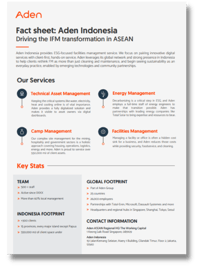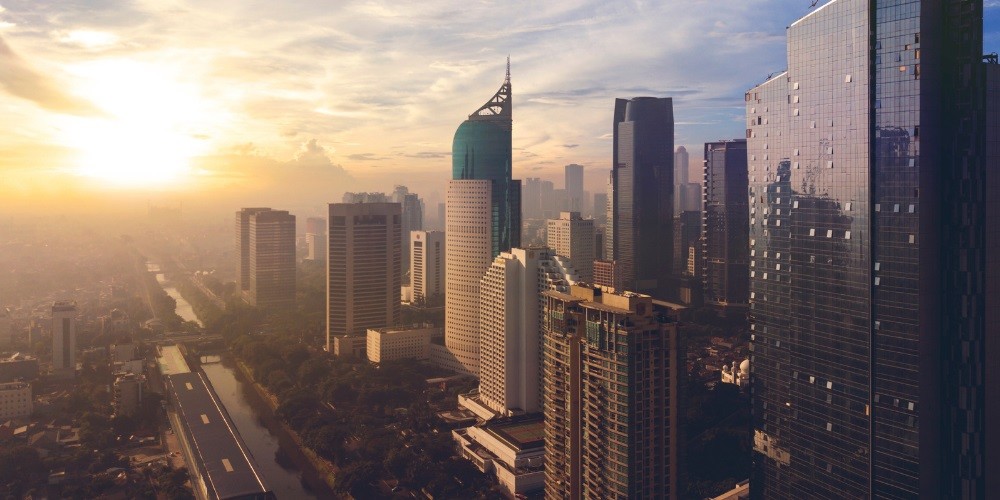Indonesia is the largest economy in ASEAN by nominal GDP and continues to push forward aggressively in commercial, industrial, and mining sectors. With a recent carbon tax policy, Indonesia has signaled that this growth need not be at the expense of the environment.
The push towards sustainability and ESG is happening all over Asia, Indonesia included. Domestic and multinational organizations that fuel the Indonesian economy still strive to be greener and more responsible for investors and employees. Businesses operating in Indonesia – especially in the built environment – should pay close attention to the developments concerning carbon emissions, ESG and digitalization.
A strong signal for low carbon development
One of Indonesia’s biggest sustainability signals is a recent set of regulations calling for carbon pricing mechanisms. This new regulation makes it the second country in Southeast Asia to establish a carbon valuation scheme. Indonesia has tried to balance the growing trend of improved environmental regulation to meet COP21 goals with its desire and need to attract FDI and foreign technology. Increasingly, to qualify in the eyes of some investors, companies must be able to meet investor ESG criteria—and while this new policy is a positive development, history has shown that there are challenges turning regulation into action. This is even more reason businesses must lead the way in low carbon development.
To fully realize Indonesia’s potential, partnerships are key
Indonesia isn’t waiting to embrace the digital and green revolutions. The country has even stated its intent to relocate and build a brand new capital city to be a haven for sustainability and foreign investment. Commodities and raw goods, which account for a large part of the Indonesian economy, have, up until recently, been offshored for manufacturing purposes, but that is shifting as well. Indonesia is taking its resource-richness and access to strategic metals and minerals like nickel and lithium to build itself into an EV battery powerhouse. As the country broadly progresses from commodity extraction to manufacturing and technology, the old way of doing business won’t be viable for much longer.

Download the Aden Indonesia fact sheet>
There are huge amounts of opportunities for newer, upmarket businesses in Indonesia, but without the right partnerships, several challenges remain. The nation’s dynamism, diversity, and scale—more than 17,000 islands in its large archipelago—means deploying in this dynamic and diverse environment requires strong local cultural knowledge as well as an established supply chain network. Being able to understand the environment, stay up to date with regional policies, work with local communities by hiring locally, and meet changing demands from both consumers and labor means clients have effective, uninterrupted, locally compliant service.
Facility management: the frontline of sustainability
Facilities management provides businesses an everyday opportunity to make progress in sustainability: it’s where the battle is fought and won. But, until recently, businesses in Indonesia have taken a traditional view of FM—single soft services or hard services often with multiple suppliers. A more modern FM approach recognizes that a broader, more holistic approach is needed to create more sustainable facilities.
Waste and water management, for example, is a major problem in Indonesia, where open dumpsites predominate the waste management system and have led to pollution and environmental degradation. Likewise, utility assets like electricity, HVAC and compressed air are run inefficiently – leading to increased carbon emissions. Meeting increased pressures to stay sustainable and low carbon from the government, investors and clients means that managing facilities must address environmental and carbon impacts. The best way to do so is to have a single integrated supplier who can provide a holistic approach to more sustainable and responsible corporate practices.
Furthermore, digitalization is a key element of ensuring transparency. Any modern approach to facility management will be smart, digitalized and managed by experts who use tech like digital twins to make data-driven decisions about how buildings can operate more efficiently. Integrating modern FM and data offers businesses powerful new insights into performance and sustainability, alongside verifiable ESG benefits.
Indonesia’s next generation
Indonesia is still a young country—and the new generation won’t settle for business as usual. The economy is moving up the value chain with tech deals booming and the EV battery sector on track to expand rapidly. As the economy strengthens and more skilled labor starts to enter the workforce, there will be a real demand from the employee base to work for companies that are more environmentally conscious. They will also expect higher standards of workplace experience, and businesses that can offer those will have a distinct advantage for attracting better talent.
Embracing the challenges of a changing Indonesian economy
Looking at the current trends in Indonesia and the greater ASEAN business world, we can see that to be successful requires more than great staff and powerful tools—it requires a mindset that takes every challenge seriously. Greenwashing business practices no longer work in the ESG age. Knowledge and experience in the local business culture are a must for international companies as technology improves how a generation of more skilled workers communicate. Sustainability efforts like carbon reduction, community-forward policies like hiring locally, and a deep understanding of creating lasting supply chain infrastructure are all instrumental to the success of businesses in a changing Indonesia.
